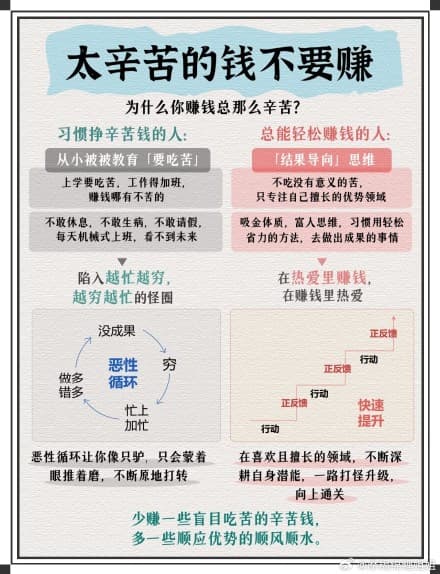Chinese Weibo Debate: The Struggle of Earning 'Too Much Hard-Earned Money'
In a recent surge of social media discussions on Weibo, Chinese netizens have been engaging in conversations about the struggles and challenges of earning money. The online debate sparked a wave of opinions and perspectives on the relationship between hard work, high pay, and finding contentment. Among the tweets, several users pontificated that one should avoid earning "too much hard-earned money."

22 February 2024
The tweets and discussions revolve around the idea that working too hard for one's income can have a detrimental effect on one's life, both physically and mentally. Some users advocate for finding opportunities that align with one's strengths and passions, rather than simply focusing on high-paying jobs that may require excessive hours and intense labor.
One Weibo user pontificates, "Don't earn that much hard-earned money," a sentiment echoed by others with tweets such as, "Why is it that when earning money, that process always has to be so tough?" This question is followed by a comparison between two types of people - those who are used to earning money the hard way and those who seem to effortlessly obtain wealth. While the former group is depicted as having been taught to suffer from a young age, the latter is shown as being able to focus solely on their natural talents and thriving in their niche advantageously.
Discussions on the platform draw attention to a variety of issues that those who earn money the hard way might face. For example, they are described as likely having to work overtime, forgo time off for illness or rest, and maintain an unyielding dedication to their occupation, which often results in a never-ending cycle of work without any perceived progression in their lives.
Another tweet that captures this sentiment reads, "Drowning in more work and poverty despite trying harder and harder," pointing to a sense of despair and dissatisfaction that comes with work that is both disproportionately demanding and inadequately rewarding. Critics also note how the pursuit of hard-earned money could potentially create physical and mental health risks due to the unrelenting pressure and stress that these jobs might impose.
Conversely, those in favor of earning money with less difficulty contend that it's crucial to harness one's strengths and passions to create opportunities that yield financial success without the need for excessive labor. The debate revolves around the concept that people should seek out ways to work smarter, not harder, especially if it means a healthier and more fulfilling lifestyle.
In fact, the notion of a "vicious cycle," often attributed to those chasing hard-earned money, is juxtaposed with an idealized image of someone operating in their zone of excellence. Confidently focused on their strengths, such individuals are depicted as enjoying a more relaxed and less stressful work environment, one in which they can thrive without the need for never-ending overtime or self-sacrifice.
Some tweets even extend this sentiment to the broader socio-economic context, observing how wealth is not merely derived from manual labor or high-paying positions requiring extraordinary work hours. The tweets emphasize the importance of cultivating an entrepreneurial spirit and a penchant for innovative thinking, especially in the modern digital age.
One user writes, "Too hard-earned money isn't worth it. Learn how to make money using your brain, not your body," while another suggests, "Love will flow towards those who are not lacking in love, and money will flow towards those who are not lacking in money!"
While some of the discussions take a somewhat passive-aggressive view, others acknowledge that financial security and comfort might not always be possible for everyone. In a more realistic tone, a user remarks, "If life were so easy that diligence led to wealth, then the world's richest person would be the best worker bee. But that's not the case." This acknowledgment underscores the complexities of the economy and the role that factors like luck, connections, and a rapidly evolving job market can play in financial success.
Some users are quick to criticize the notion that earning money the hard way should be avoided, with one tweet expressing, "The person who advises you to avoid hard-earned money is likely a scammer who profits off providing emotional value in exchange for exploitation." Others argue that while it's essential to find enjoyment and fulfillment in one's work, it's crucial not to shun or belittle those who choose to work in physically demanding or high-paying industries.
Overall, the Weibo discussions offer a fascinating insight into the complexities of the modern Chinese labor market and the work-life balance that people strive to achieve. As in many countries, striking the right balance between work and play is an ongoing challenge for many Chinese citizens. However, the conversations on Weibo signal an increasing awareness of the importance of finding meaningful, fulfilling, and financially rewarding work that doesn't necessitate excessive sacrifice or sufferance.
In the end, as one user succinctly puts it, "Make sure you're earning your money in a way that brings you joy and satisfaction. That's the only way to ensure that your life doesn't become a never-ending cycle of hard work without any tangible progress."
In this context, social media discussions focusing on the trials and tribulations of earning money serve not only as an outlet for venting frustrations but also as a means of promoting dialogue and shared understanding about the challenges faced by workers across all industries. These virtual conversations sparked by tweets and in-depth discussions likely resonate with a wide swath of Chinese citizens struggling to navigate the complexities of balancing a career that pays well with one that brings them joy, fulfillment, and a sense of purpose.
As the discussions on Weibo continue to evolve and unfold, it is evident that the discourse around work, money, and life satisfaction holds the potential to inspire meaningful change and shift societal attitudes towards a more holistic, balanced, and humane understanding of success and prosperity.




